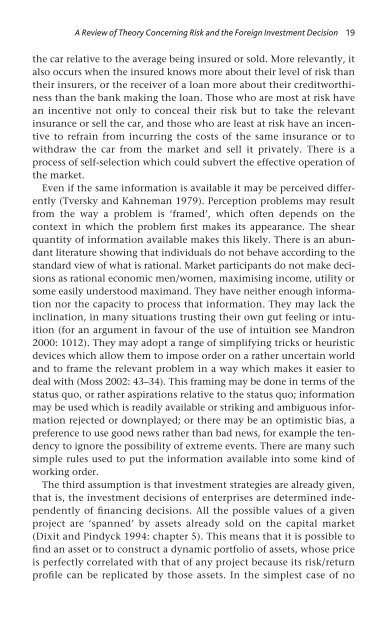Risk and Foreign Direct Investment - Index of
Risk and Foreign Direct Investment - Index of
Risk and Foreign Direct Investment - Index of
You also want an ePaper? Increase the reach of your titles
YUMPU automatically turns print PDFs into web optimized ePapers that Google loves.
A Review <strong>of</strong> Theory Concerning <strong>Risk</strong> <strong>and</strong> the <strong>Foreign</strong> <strong>Investment</strong> Decision 19<br />
the car relative to the average being insured or sold. More relevantly, it<br />
also occurs when the insured knows more about their level <strong>of</strong> risk than<br />
their insurers, or the receiver <strong>of</strong> a loan more about their creditworthiness<br />
than the bank making the loan. Those who are most at risk have<br />
an incentive not only to conceal their risk but to take the relevant<br />
insurance or sell the car, <strong>and</strong> those who are least at risk have an incentive<br />
to refrain from incurring the costs <strong>of</strong> the same insurance or to<br />
withdraw the car from the market <strong>and</strong> sell it privately. There is a<br />
process <strong>of</strong> self-selection which could subvert the effective operation <strong>of</strong><br />
the market.<br />
Even if the same information is available it may be perceived differently<br />
(Tversky <strong>and</strong> Kahneman 1979). Perception problems may result<br />
from the way a problem is ‘framed’, which <strong>of</strong>ten depends on the<br />
context in which the problem first makes its appearance. The shear<br />
quantity <strong>of</strong> information available makes this likely. There is an abundant<br />
literature showing that individuals do not behave according to the<br />
st<strong>and</strong>ard view <strong>of</strong> what is rational. Market participants do not make decisions<br />
as rational economic men/women, maximising income, utility or<br />
some easily understood maxim<strong>and</strong>. They have neither enough information<br />
nor the capacity to process that information. They may lack the<br />
inclination, in many situations trusting their own gut feeling or intuition<br />
(for an argument in favour <strong>of</strong> the use <strong>of</strong> intuition see M<strong>and</strong>ron<br />
2000: 1012). They may adopt a range <strong>of</strong> simplifying tricks or heuristic<br />
devices which allow them to impose order on a rather uncertain world<br />
<strong>and</strong> to frame the relevant problem in a way which makes it easier to<br />
deal with (Moss 2002: 43–34). This framing may be done in terms <strong>of</strong> the<br />
status quo, or rather aspirations relative to the status quo; information<br />
may be used which is readily available or striking <strong>and</strong> ambiguous information<br />
rejected or downplayed; or there may be an optimistic bias, a<br />
preference to use good news rather than bad news, for example the tendency<br />
to ignore the possibility <strong>of</strong> extreme events. There are many such<br />
simple rules used to put the information available into some kind <strong>of</strong><br />
working order.<br />
The third assumption is that investment strategies are already given,<br />
that is, the investment decisions <strong>of</strong> enterprises are determined independently<br />
<strong>of</strong> financing decisions. All the possible values <strong>of</strong> a given<br />
project are ‘spanned’ by assets already sold on the capital market<br />
(Dixit <strong>and</strong> Pindyck 1994: chapter 5). This means that it is possible to<br />
find an asset or to construct a dynamic portfolio <strong>of</strong> assets, whose price<br />
is perfectly correlated with that <strong>of</strong> any project because its risk/return<br />
pr<strong>of</strong>ile can be replicated by those assets. In the simplest case <strong>of</strong> no




